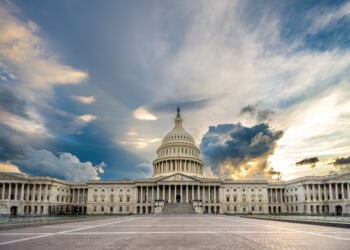Consequences unintended, though not unforeseen, lurk within many of the most popular proposals in technology policy. In their haste to achieve some perceived good, lawmakers hurry past the warnings of analysts standing athwart proposals equally fashionable and shortsighted. This kind of hurry is striking coming from conservatives, who usually point out the unintended consequences of others’ plans. Almost by second nature, conservatives often recur to Frédéric Bastiat’s observations on that which is seen and that which is not seen, and all the other trite and true aphorisms that serve as the sturdy foundations of the conservative’s skepticism of energetic regulatory experimentation. In the regulation of the digital world, however, many seem to believe that the ordinary constraints imposed by human nature and the laws of economics, which arouse a hardy skepticism of state action, do not obtain.
The App Store Freedom Act (ASFA), introduced by Rep. Kat Cammack (R-Fla.), evidences the eagerness to regulate and the disbelief in tradeoffs all too typical of legislators who neglect the cornerstones of conservatism when considering tech policy.
The trouble is that ASFA … would eviscerate the ability of parents to manage their children’s online lives and guard them against unsavory and child-unfriendly corners of the internet.
Cammack — a Republican, it bears emphasis — hopes to compel large app stores (those with 100 million or more American users) to allow their users to download applications from unvetted third-party sources, a process known as sideloading. She advanced her bill “to promote competition and protect consumers and developers.” The trouble is that ASFA, in all its haste and shortsightedness, would eviscerate the ability of parents to manage their children’s online lives and guard them against unsavory and child-unfriendly corners of the internet. None of this seems to have been considered by the bill’s advocates.
Large app stores provide a suite of parental controls, subjecting child accounts to robust adult supervision. For example, on Apple devices, parents may approve or deny their children’s requests to download applications or make in-app purchases, restrict the use of preloaded applications, block access to objectionable content or applications marked as intended for users above a given age, designate protective privacy settings, and much more.
Much of this system’s efficacy depends upon the device restricting the user — the child, in this case — to the App Store. ASFA and similar sideloading mandates undo the sole effective child-safety mechanism available. Should the bill become law, a child blocked from downloading a given application is likely to be able to find and obtain that application from another, less secure, less controlled application store.
This warning is no mere conjecture. In February, following a European sideloading mandate, the Washington Post reported that “an iPhone porn app called Hot Tub [became] available … from one of the non-Apple mini app stores created under a landmark [European Union] law” — the first such app to be made available to iPhone users, because the App Store bans pornography.
Similarly, in 2024, when it seemed likely that TikTok would be removed from app stores’ digital shelves, one analyst noted that a sideloading mandate would ensure that the Chinese app would remain readily available, writing: “All TikTok would have to do is find a foreign web host and it would be able to keep funneling American data back to the CCP without divesting from ByteDance.”
Cammack, who co-sponsored the Protecting Americans from Foreign Adversary Controlled Applications Act (the bill reductively labeled a “TikTok ban”), would have done well to weigh this fact before introducing the ASFA.
Apple cannot keep pornography and other objectionable content from children if the regulators prevent the company from doing so. In view of the European experience, American parents must consider whether they wish for the devices in the pockets of American children to function as portals to such content — and whether they wish the federal government to restrain large app stores attempting to withhold such content from children.
“I want to do everything I possibly can to protect [kids] and their families,” Cammack said in an interview, as she explained her concern for children whose access to social media and other digital platforms is unmediated. ASFA would render that desire unattainable.
Big-government types — even if their statist proclivities are confined to the digital world — convince themselves that when they heave regulatory stones into the lake, the surface will, despite the impact, remain calm, placid, and undisturbed. But ripples — and often waves — invariably are made, their effects largely uncontrollable by the stone-casters in Congress.
The advocates of ASFA, inveighing from dawn to dusk against the deficiencies they perceive in digital markets, ought to consider the consequences, unintended, though not unforeseen.
READ MORE from David B. McGarry:
When Government Competes, America Loses
Why Free Speech Needs Congressional Action
Republicans Should Reject European-Style Tech Policy
David B. McGarry is the research director at the Taxpayers Protection Alliance.







![Florida Officer Shot Twice in the Face During Service Call; Suspect Killed [WATCH]](https://www.right2024.com/wp-content/uploads/2025/12/Inmate-Escapes-Atlanta-Hospital-After-Suicide-Attempt-Steals-SUV-Handgun-350x250.jpg)







